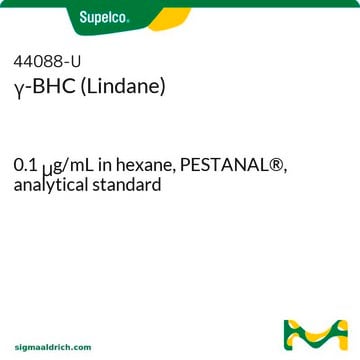89928
Azinphos-methyl-(dimethyl-d6)
PESTANAL®, analytical standard
Synonym(s):
Azinphos-methyl-d6, Methyltriazotin-d6
About This Item
Recommended Products
grade
analytical standard
Quality Level
product line
PESTANAL®
Assay
≥98.0% (HPLC)
shelf life
limited shelf life, expiry date on the label
application(s)
agriculture
format
neat
storage temp.
2-8°C
SMILES string
O=C1N(CSP(OC([2H])([2H])[2H])(OC([2H])([2H])[2H])=S)N=NC2=CC=CC=C21
InChI
1S/C10H12N3O3PS2/c1-15-17(18,16-2)19-7-13-10(14)8-5-3-4-6-9(8)11-12-13/h3-6H,7H2,1-2H3/i1D3,2D3
InChI key
CJJOSEISRRTUQB-WFGJKAKNSA-N
General description
Application
Isotope-labeled compounds are increasingly used in isotope dilution mass spectrometry (IDMS) for the quantitative analysis of pesticides. The major advantage of using this technique is that the isotope-labeled compounds have nearly the same physical properties as their non-labeled counterpart analogs, and thus show identical behavior during the workup and sample preparation process. This helps in overcoming the problems of matrix effects generally encountered in the usual LC-MS/GC-MS analysis potentially resulting in biased results. By spiking the sample before workup with its isotope labeled analog, the loss of analyte that leads to matrix effects can be determined and compensated.
Legal Information
Signal Word
Danger
Hazard Statements
Precautionary Statements
Hazard Classifications
Acute Tox. 1 Inhalation - Acute Tox. 2 Oral - Acute Tox. 3 Dermal - Aquatic Acute 1 - Aquatic Chronic 1 - Skin Sens. 1
Storage Class Code
6.1A - Combustible acute toxic Cat. 1 and 2 / very toxic hazardous materials
WGK
WGK 3
Flash Point(F)
Not applicable
Flash Point(C)
Not applicable
Choose from one of the most recent versions:
Already Own This Product?
Find documentation for the products that you have recently purchased in the Document Library.
Our team of scientists has experience in all areas of research including Life Science, Material Science, Chemical Synthesis, Chromatography, Analytical and many others.
Contact Technical Service








